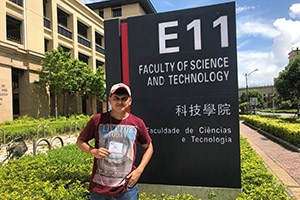Faraz Mohammadali Shaikh, a PhD student from the Faculty of Science and Technology (FST), University of Macau (UM), recently discovered two Ebola virus drug candidates. The groundbreaking discovery has been validated by collaborators from the University of Oxford through biological experiments, attracting international attention. Shaikh was awarded the Carl Storm International Diversity Fellowship, which sponsored him to attend the 2019 Computer-Aided Drug Design Gordon Research Seminar (GRS) and the 2019 Computer-Aided Drug Design Gordon Research Conference (GRC) in the United States to present his findings, in order to help the medical industry develop more anti-Ebola drugs.
The research study was conducted by Shaikh under the guidance of Assistant Professor Shirley Siu Weng In from the FST. Using hierarchical molecular docking techniques, Faraz computationally screened a traditional Chinese medicine-derived library of nearly 2.5 million compounds against the Ebola glycoprotein, from which he identified eight candidates with potential inhibitory effects on Ebola infectious activities. Biological experiments were carried out later by collaborators from the University of Oxford, and eventually, two compounds were validated to show strong activity against viral entry. The groundbreaking discovery has been published in the Journal of Medicinal Chemistry.
Those invited to speak at the GRS were students and post-doctoral scholars from world-renowned universities, including the University of Oxford, the University of Cambridge, Boston University, Hamburg University, and other universities in the United States. The speaker list was made based on the impact of the individuals’ research. Shaikh was the only PhD student from an Asian university to speak at the seminar.
At the other event, the GRC, Shaikh presented a poster on his recent work on LigTMap – a novel computational workflow designed to rapidly identify protein targets upon which a small molecule could induce effects. The efficient prediction is based on multi-stage molecular fingerprint filtering, the in-house developed swarm-optimised docking technique, and artificial intelligence technology. The conference attracted leading scientists in the field from around the world. Participants had in-depth discussions on recent advances at the intersection of big data, small molecules, and macromolecular protein structures, with an emphasis on novel computational methods and their real-world applications.
澳門大學科技學院博士生Faraz Mohammadali Shaikh發現了兩種抑制伊波拉感染的候選藥物,並經牛津大學確認其成效,可進一步研製成藥物。此研究引起國際關注,卡爾•斯托姆國際多樣化獎學金(CSID Award)更資助該博士生,赴美國參與“2019年計算機輔助藥物設計戈登研究研討會”和“2019年計算機輔助藥物設計戈登會議”並發表成果,助醫學界開發更多抑制伊波拉病毒的藥物。
Shaikh在澳大科技學院助理教授蕭詠然的指導下,針對伊波拉病毒醣蛋白, 以電腦分子對接技術,向內有近250萬化合物由中藥衍生的數據庫進行篩選,並鎖定了8個對伊波拉感染具潛在抑制作用的候選物,經牛津大學專家進行生物學驗證後,最終確認了兩種化合物可抑制病毒感染,並可作進一步研製藥物。此研究今年在醫學期刊《Journal of Medicinal Chemistry》發表。
今屆計算機輔助藥物設計戈登研究研討會吸引眾多來自牛津大學、劍橋大學、波士頓大學、漢堡大學(德國)和其他美國大學的學生和博士後參與,而Shaikh是唯一一位來自亞洲區大學的博士生。
此外,Shaikh還在計算機輔助藥物設計戈登會議上,展示另一最新研究項目“LigTMap”,此為新型計算工作流程,利用多重的分子指紋篩選,以實驗室自研發的粒子群優化的分子對接技術和人工智能,可快速地識別小分子的蛋白質靶標。該會議匯聚世界各地頂尖科學家,就“大數據、小分子和大分子蛋白質結構相互關係"議題,探討現實環境中的相關應用程序配對的新穎計算方法。

Two Ebola virus drug candidates discovered by UM student Shaikh have been validated by the University of Oxford. Shaikh
發現發現兩種抑制伊波拉病毒藥物

